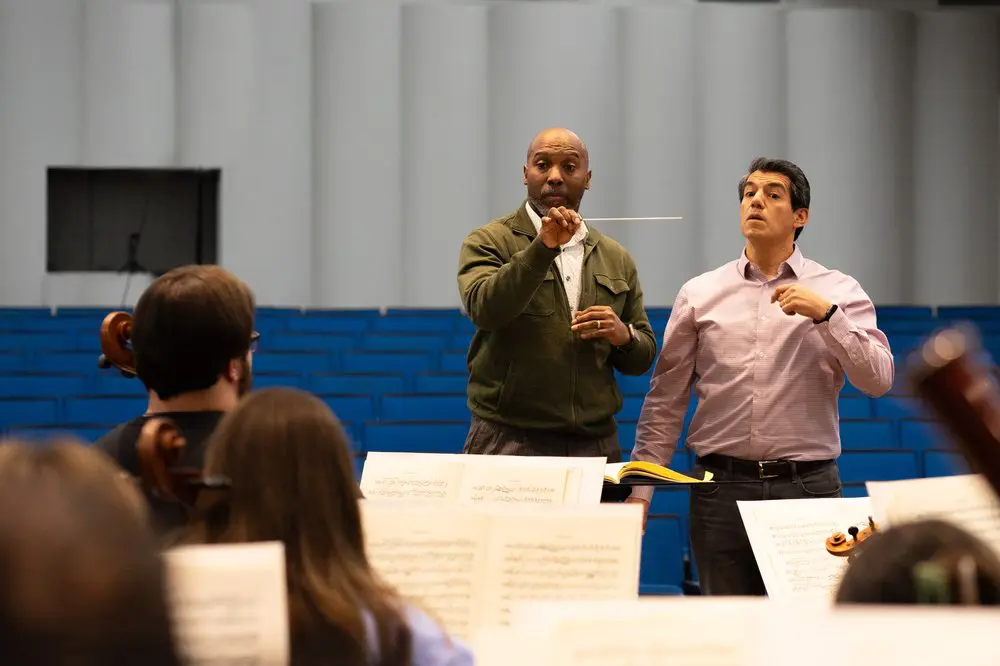Since stepping down as music director of the Fort Worth Symphony Orchestra in 2020 after a 20-year tenure, conductor Miguel Harth-Bedoya has increasingly turned his time and efforts toward training the next generation of conductors while still maintaining a busy guest conducting schedule.
For the past three years, he has served as the Mary Franks Thompson Professor of Orchestral Studies and Music Director of the Baylor Symphony Orchestra, leading the ensemble to milestone performances at both Bass Performance Hall and Morton H. Meyerson Symphony Center. Speaking at Orchestra Hall following a recent rehearsal, the Emmy Award-winning and Grammy-nominated conductor reflected on his approach to teaching and his new position at Houston’s Rice University.
Conductors and virtuosos commonly take faculty positions later in their careers without prioritizing those appointments, the former Fort Worth Symphony Orchestra music director tells PaperCity Fort Worth.
“I wouldn’t want to study with someone if I’m a side project,” he says. “I am completely invested in this. My guest engagements work around my teaching schedule. Teaching is sharing what I know and what I’ve done. If I don’t know something, I’ll learn it for the sake of passing it on. It gives me motivation to continue growing. I’ve been fortunate in this [new phase of my career] that major orchestras in Philadelphia, San Francisco, and the Metropolitan Opera still invite me to conduct. If anything, I feel that I am learning more by teaching.”

The Shepherd School of Music to Launch Nation’s Only Undergraduate Conducting Degree
Miguel Harth-Bedoya has been a long-time proponent of offering conducting degrees for undergraduates, a program common in Europe and South America but one that simply doesn’t exist in the United States. As an undergrad at the Curtis Institute, Harth-Bedoya had the opportunity to major in conducting, as many other conductors did before him.
Though the reasons remain unclear, U.S. conservatories and music schools phased out the programs over the past two decades, leaving only master’s-level conducting degrees in place. When Shepherd School of Music Dean Matthew Loden approached Harth-Bedoya about the possibility of directing the university’s orchestras and teaching conducting, Harth-Bedoya said his only request was that the university allow him to create an undergraduate conducting program.
Considering all that conductors have to learn simply to be able to lead an orchestra, two years at the graduate level is far from enough time to learn those skills, Harth-Bedoya says.
“Many instrumentalists only need to read their own clef,” he says. “We need to read treble, alto, bass, and tenor at least. We have to learn how to transpose every single instrument. If you cannot read, you are not literate. When you are reading an orchestral score, the plus symbol can appear in the horn, trumpet, or violin, but it means something completely different for every instrument. To the eye, it is just a circle, but the implications of a circle are enormous. The list goes on.”
Applications for the first undergraduate conducting class will be accepted this December, with an inaugural class of one or two students starting in fall 2026. At most, Harth-Bedoya says the undergraduate program will have around six students in addition to graduate-level conductors. In addition to teaching conducting, Harth-Bedoya will lead the Shepherd School Symphony Orchestra, Shepherd School Chamber Orchestra, and Campanile Orchestra.
A New Chapter at One of America’s Leading Music Institutions
The Shepherd School of Music, he says, is easily among the top four university and conservatory music programs in the country, alongside The Curtis Institute of Music, The Juilliard School, and the Colburn School.
“We see where the best music students are going to or from,” he continued. “In the past 10 years, the Shepherd School has been producing more professional orchestral students than any school. Their focus is on orchestral training and opera.”
Rice is also a leading university when it comes to exploring the therapeutic effect of music on cognition and well-being through its Rice Electroacoustic Music Labs, which the conductor says he looks forward to learning more about. Although the award-winning conductor will be spending much of his spring and fall in Houston, he is keeping his home in Fort Worth and will continue heading The Conducting Institute, which hosts summer conducting workshops in town.
The new position allows him to teach but also to continue his lifelong passion for making and sharing music, something he says we are all intrinsically qualified to do.
“We are all made of music,” he says. “You have a heartbeat, which is like a pulse. You have a rhythm for doing things. And you have an instrument — your voice.”